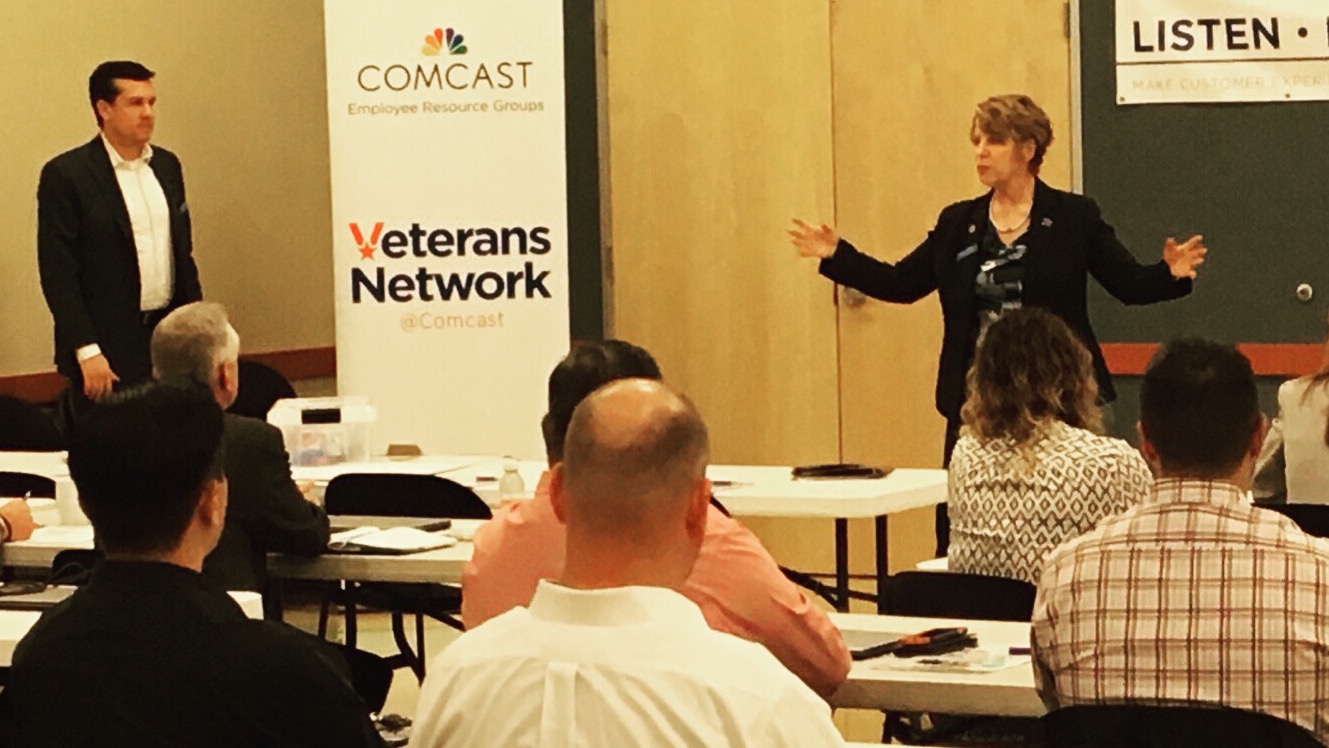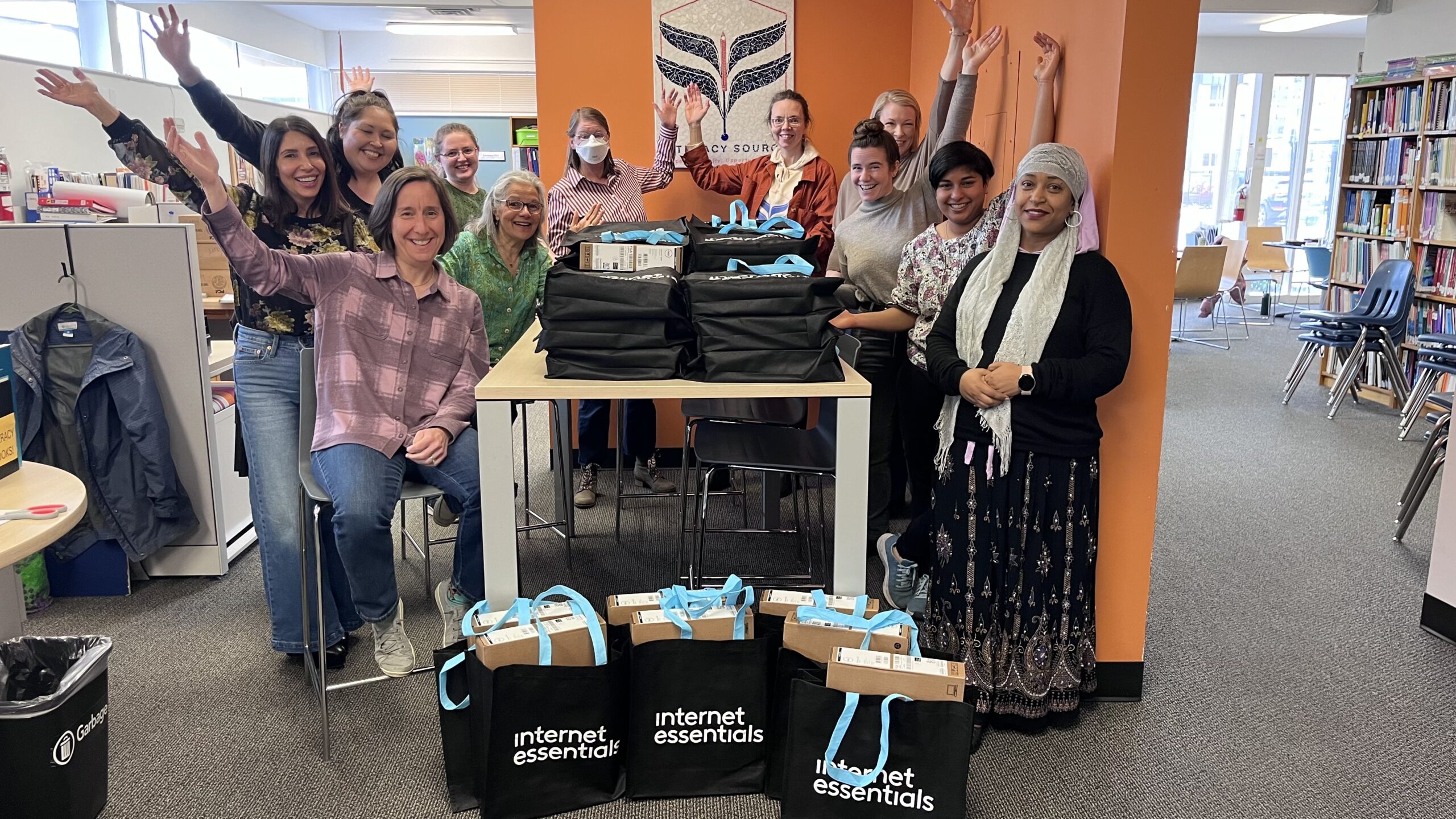It was quite a sight to see the former head of significant operations in Iraq as well as a tank commander, a combat medic and a cargo aircraft pilot stand in front of a roomful of hiring managers recently.
When they described their former roles in the military, the four of them were making a point: If you want to hire veterans in your organization, you have to think beyond job titles. Because those four people are not acting as commanders, medics or pilots for Comcast. Today, they are successful and valued members of the human resources team specifically commissioned by Comcast to help us hire more veterans and other members of the military community.
Their talents go beyond labels on a resume. In introducing her team, retired U.S. Army Brig Gen. Carol Eggert pointed out that sure they had learned how to fly and treat the wounded. But what the four had also learned were significant skills that could help any employer in the workplace and in a wide variety of roles.
“These are the folks who can make things happen in a workplace,” Eggert explained.
Eggert is Senior Vice President of Military and Veteran Affairs for Comcast. She might be remembered locally for an enthusiastic event we held to celebrate the large number of veterans at our new Spokane call center. More recently, Eggert and her team came to Seattle as part of a military hiring roadshow. Comcast is in the middle of keeping its promise to hire 10,000 members of the military community. We’ve exceeded our goals in Washington, but of course we have a great advantage, what with significant military bases in such places as Spokane, Pierce County and Bremerton.
Here were some of the tips shared by the recruiters if you’d like to hire members of the military community. These are certainly not just for Comcast:
- If you value experience from the military, say in the job ad that military experience is valued. Veterans will be looking at those ads, trying to decide where to apply, and they’ll appreciate it if you say you’re looking for them.
- If you’re composing a display ad that reaches out to veterans, be very careful about the quality of the art and wording used. One of Eggert’s team members said that it’s not uncommon for members of the military community to look at an ad and focus on “uniform deficiencies” and other issues with the photo rather than on the ad itself. In other words, they know if your company is trying to ‘fake’ a photo of the military in action.
- Don’t think about saying you want to hire veterans because they deserve it somehow. Of course, hiring veterans is the right thing to do. But … “Veterans want to be recognized for the skills we’re bringing to the community,” Eggert said.
- Recognize that in the job interview, the applicant might not act like someone who has been in civilian job interviews. Many veterans were recruited to join the military; they may never have been in a civilian job interview. Ever. One of Eggert’s colleagues held the audience spellbound as he described how a military promotions panel is so different than a civilian experience. For example, some members of the military learn you should look at the forehead of the person you’re interviewing with. Imagine how that might look to a civilian hiring official if he or she isn’t expecting the applicant to look at her or his forehead.
- Some veterans might think their role in the job interview is to know their resume inside and out and want to stick to that. You have to specifically tell the person that you want to learn more about them than what’s on the resume: for example, saying explicitly, “I want to get to know who you are.”
- Many employers refer to hiring “veterans.” Eggert uses the term “military community” because that encompasses not only veterans, but also those currently serving in the National Guard and Reserve, as well as military spouses. She noted that military spouses are an important part of that community; and because they may move around from place to place, they are sometimes under-employed.
The workshop concluded with a panel of recent Comcast new hires who are veterans. They described how any employer can support members of the military community. For example, a new employee in the Olympia Xfinity store, Malorie Kennedy, left active duty in April and is now a sergeant in the Washington Army National guard. Of course she knows that legally, employers must let reservists go off for training, but she still wondered how her supervisor would react. When she said she told her manager she would have to take weeks away from the store for training, “He didn’t flinch. He said, “That’s awesome. Good for you.”
And it is. Veterans are good for all of us.
And while that’s a strong closing sentence to live by, we don’t want to forget: if you are a veteran or other member of the military community interested in employment, please visit this Comcast jobs portal: https://jobs.comcast.com/military If you know someone in the military community who might be interested, please pass this along! You can follow the latest news about Eggert’s team and our commitment to hiring members of the military community via https://twitter.com/comcastmilitary
Here’s a photo of the panel of recent hires, flanked by members of our employee resource group for veterans. Kennedy is at left, seated.




